
Every family has its own interpretation of the sacrosanct family vacation. It might take the form of spending long weekends in the second home at the edge of some body of water; pitching a tent at a campsite in the mountains; dropping the children at camp and going off on your own; or, in the case of my childhood family, packing the ungrateful kids into the back of the station wagon—and, I do mean the back as these early childhood trips definitely pre-date any seatbelt laws–and driving endless hours to destinations days away.
The sacrosanctity of my family vacation traditions were not to be questioned by mere mortals, especially children. They were carved in stone by my father and that was that. Vacations were three weeks long and we went to Mexico: first to Puebla where my aunt and uncle lived, then to Mexico City where they later moved, and still later to Mazatlan, a sleepy fishing village that my parents fell in love with. Departure was always pre-dawn and we drove (and drove and drove).
On the day of departure, my brother and I were roused from sleep at four o’clock in the morning to “get a good start” on our 2000-mile drive from the Central Valley of California to the center of Mexico. The average family did not drive to Puebla, Mexico in the early 1960s because there were very few roads normal folks would want to drive on. (Ah, but we were anything but normal.)
Road conditions were a huge consideration or, even more basically, would there still be a road…
when the Newman family came tooling along? Despite our best-laid plans—always with advice from our faithful partner, Triple A—occasionally there wasn’t a road for one reason or another. The availability of “services” was another issue; that is, would there be amenities like gas stations, restaurants, and motels? Although this factor couldn’t have been weighed too heavily by my parents since my father’s foot seemed to be permanently glued to the gas pedal once we boarded the car; with so painfully few bathroom stops, my brother and I might have been training for Kennedy’s Race to the Moon (but my father was a died-in-the-wool Republican, so that was not his goal). Personal safety was another consideration—there were no drug cartel sorts toting machine guns back then but thieves were certainly rumored to prey on gringos like us. I hasten to add that nothing of the sort ever happened in all the years we drove below the Rio Grande.
So, for reasons like the aforementioned, we always found ourselves on the rather circuitous route through Arizona, New Mexico, and Texas before we even went south of the border. It was an interminably long drive for my brother and me (and probably my mother, too). But when we were not arguing or pleading for a merciful bathroom stop (or at least a big bush), the long drives were interesting—my mother would say “Their eyeballs were as big as saucers” when telling others about our experiences—and, even then, if asked by a stranger, I would confess that they were fun.
In Guaymas, along the Pacific coast, we saw a brilliant electrical storm that lit up the night sky for minutes and scared the bejesus out of my brother and me. All along the way, we saw poverty that scared us in a different way, images that remain vivid in my mind to this day. Once we arrived, there were my beloved cousins as well as real pyramids to climb, volcanos in view from my aunt and uncle’s windows, and markets to visit where vendors hung their slabs of meat seemingly for the benefit of the flies.
We made this trip every summer for years. As I look back on those vacations, I am now so grateful that our family was fortunate to have such long vacations and that my parents chose to include the whole fam damily. In the early 60s in California, it could have been so easy to relegate the family vacation to Disneyland—a destination I certainly held in high esteem at that time and, if truth be told, probably would have said I preferred—but, I am very glad we took that long road to another culture and lots of adventures.
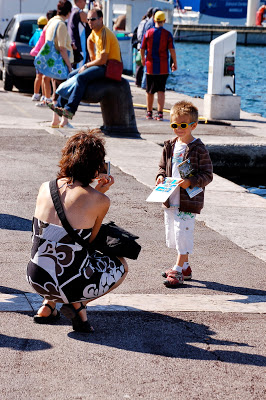 |
| Photo: David Scott Allen |
My husband came from a family that took similar trips and we both agreed that family vacations were really important. We have taken our daughter many places–near like the coast of Maine and far like Argentina—but Provence, as many readers know, captured our hearts and has been a main destination for our family for many years.
So, what do kids like to do in Provence? Based on our experiences with our daughter as well as with many young folks who have visited us in Provence, we offer the following recommendations for memorable vacations:
1. Stay in one place for at least a week. Familiarity breeds comfort and confidence, especially important feelings for children and feelings that will encourage them to become acquainted with the new culture and maybe even try out a few French words. We prefer vacation homes so that we can prepare meals and really relax after a busy day.
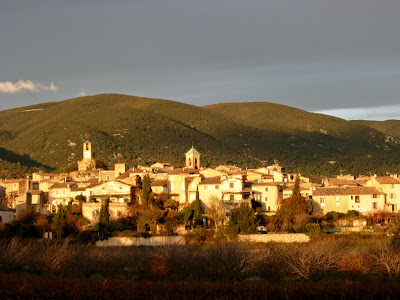 |
| Village of Lourmarin |
2. Stay in a small village where, depending on their ages, the children can roam around relatively freely. Lourmarin has long been our first choice. We rented a village house and later owned our own home in the heart of the village. There, our daughter could walk to the Tabac or Patisserie where she could practice her French and develop a self-assuredness and poise even in a foreign culture.
Lourmarin has a 16th-century château that can be toured but, more importantly in the eyes of most children, the village has an inviting playground, a huge soccer field, a pool, and tennis courts. Nearby is a small lake, l’étang de la Bonde.
3. Hiking or long walks are a great way to see the area and expend some energy. Near Lourmarin, there are many trails. One of our favorites is a short walk through a lovely wooded area that ends at restaurant and hotel, Auberge de l’Aiguebrun. Drive north from Lourmarin on the D943 (Route d’Apt). About 5 kilometers up this road, look for a sign advertising the Auberge and then watch for a pull-out along the right side. Park there—don’t leave any valuables—and walk north on the highway to a dirt road on the right. The dirt road will narrow to a path and take you to the Aiguebrun river and to a lovely 17th century bridge. Continue several more kilometers to the Auberge.
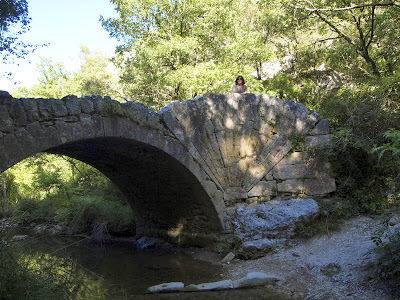 |
| 17th century bridge over the Aiguebrun river |
Fort Buoux, a few kilometers further is another rewarding hike. Drive a couple kilometers up the D943 and turn right toward Buoux. Follow the signs for Les Seguins and Fort Buoux until you come to a parking lot. Walk along the dirt road, past a large overhanging rock, which turns into a path that takes you to the caretaker’s door where you will pay a nominal fee allowing you to continue on to the remains of this medieval fort. Consider taking a picnic lunch to enjoy while you take in the panoramic views of the Luberon. (Note: this is an activity for agile and sure-footed children who will follow the guidance of adults as the paths are rocky and somewhat steep in places and there are not protective guardrails at the edge of sheer drop-offs.)
4. Roman ruins are a huge hit with children of all ages. We recommend day trips to Pont du Gard, Arles, or Glanum for interesting and beautiful Roman sights. On one of our visits to the Pont du Gard, our daughter and a good friend who was visiting from home were in 6th grade and taking Latin. When they returned, a class assignment was to construct an aqueduct—you can imagine which one they chose! For the adventurous family, there are canoes to rent to paddle along the Gard river and under the Pont du Gard.
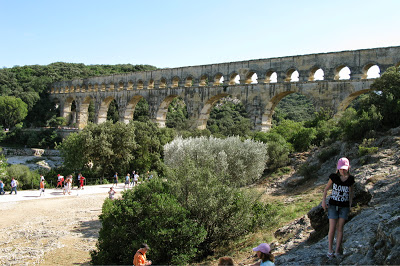 |
| Pont du Gard |
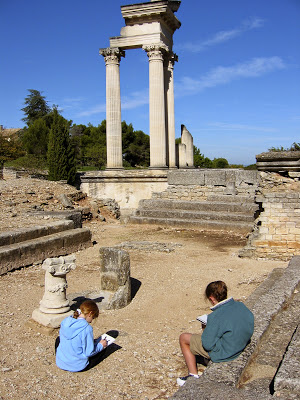 |
| Glanum |
Glanum, a recently excavated Greco-Roman sight near Saint Remy, offers the opportunity to walk around this recently excavated community that dates back over 2000 years.
5. To experience what Provence was like in the Middle Ages, we recommend Les Baux de Provence, Tarascon’s castle, and Lourmarin’s castle.
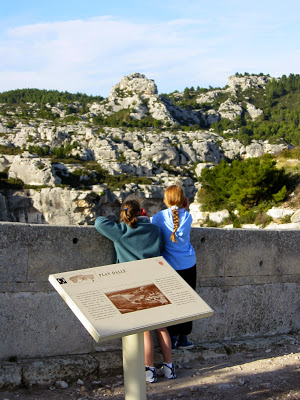 |
| Les Baux de Provence |
Les Baux, both a restored medieval village and fortress, is a must-see destination. Too much to write here and it is described in every tour book, so suffice to say that, despite its transparent appeal to tourism, this ancient village is charming and the notorious fortress is amazing. From the top of the rocky cliff upon which the village and fortress are perched, there are spectacular views of the surrounding valley and the Alpilles mountains. Arrive early and definitely rent the audio guides. (Note that Fort Buoux is the same period.)
A thoroughly modern experience (next to Les Baux) that is a huge hit with kids is Carrières de Lumières— definitely consider a visit there.
Tarascon’s 15th-century château sits on the edge of the Rhone River. Austere and foreboding on the outside, it is inviting and fascinating on the inside. Lourmarin’s château lacks the grandeur of Tarascon’s castle (from roughly the same period) but is still definitely worth a visit, especially if staying nearby.
6. The Village des Bories is an open-air museum of restored stone huts (bories) that date back 200 to 500 years and were inhabited until the early 19th century. Stone huts probably pre-date the Romans and can still be spotted in fields in the Luberon. This collection of 20 or so structures consists of dwellings, animal pens, and storage huts. No mortar in the whole village. Lots of walking, lots of opportunity for discovery and imagination.
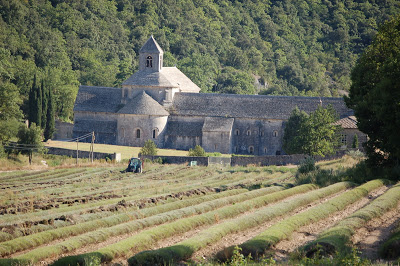 |
| Village of the Bories (above), Gordes (middle) and Abbaye de Senanque (below) |
This Village is near the quintessential hill-top town of Gordes and the 12th-century Cistercian Abbaye de Senánque.
7. For a trip to a city, we recommend Aix-en-Provence. There is something for all ages in this sophisticated city, known as the “Paris of the South.” Two museums to consider are the Musée Granet, referred to as a museum of “Archeaology and Fine Arts,” it houses a small but impressive collection of paintings by well-known French, Italian, and Dutch artists, including Aix’s Cezanne, and interesting artifacts from the nearby Celto-Ligurian archaeological site, Entremont (that can also be visited). The Natural History Museum has dinosaur eggs—need I say more?– and other fossilized remnants left from the days that dinosaurs roamed the South of France. There is also lots of shopping, an English book store, and a cinema that features movies catering to English speakers. For people watching, you can’t beat Les Deux Garcons.
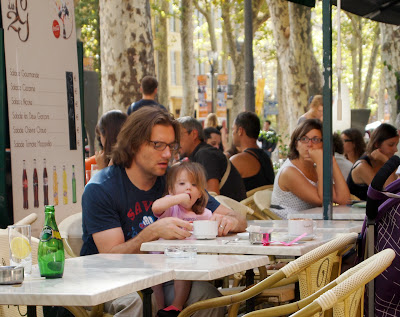 |
| Les Deux Garcons |
8. Another museum to consider would be La Petite Provence du Paradou, where over 400 Santons, those precious tiny clay figures that compose the Provençal crèches, may be found in all sizes and characters. If you plan ahead, you may even be able to make your own Santons.
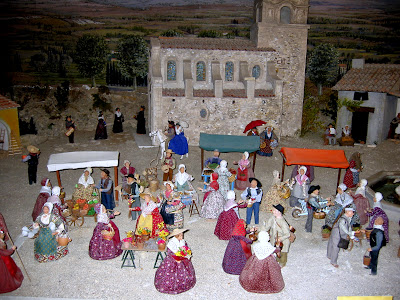 |
| La Petite Provence de Paradou |
9. Provence, of course, is known for its weekly markets. If you are visiting in the peak tourist season, make sure to arrive early at these markets. The popular markets will get very crowded as the morning progresses and may be overwhelming to children and very difficult to navigate while juggling a basket and holding a little hand. Depending on the ages of your children, give them each their own basket, a purse of Euros, and an assigned purchase. (Stay away from the cute kitties and puppies as the adults that run that operation will reel you in with sympathy and then beseech you to make donations to help the animals.)
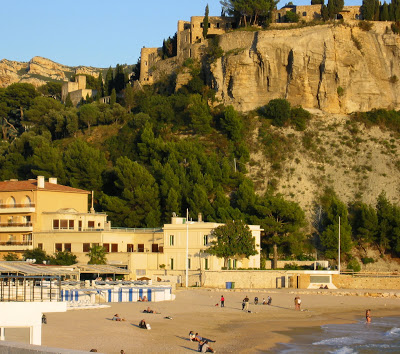 |
| Cassis Port (above) and the beach near the Port (below) |
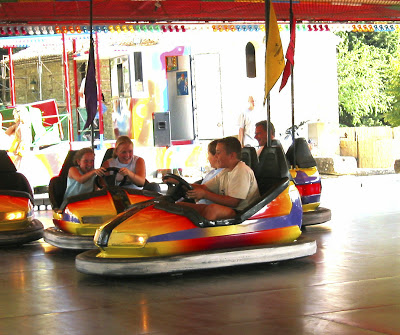 |
| Fete Votive of Lourmarin (above and below) |
12. Places to eat with children are many in the Luberon area. In Lourmarin, my list would include any of the cafes (we favor Café Gaby), Pizzeria Nonni, and take-out pizza from Le Pan Garni. I would not discourage you from taking well-behaved children to any of the gastronomic restaurants, though, as parents don’t want to miss such an experience and what better time to introduce your child to fine dining?
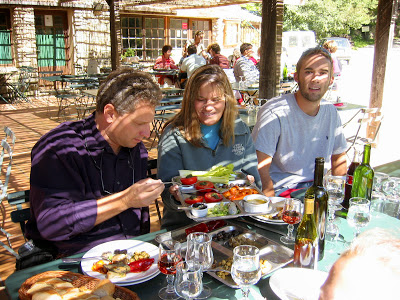 |
| Lunch at Auberge des Seguins |
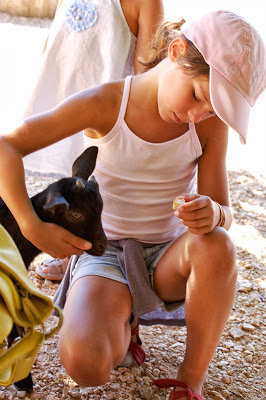 |
| Photos: David Scott Allen |
For ice cream, pack the kids in the car and head to L’Art Glacier just past Ansouis.
Finally, there are glorious spots for picnics all over the Luberon. One of our favorites is in La Forêt des Cèdres (the Cedar Forest near Bonnieux).
When children are young, we suggest eating lunch out and dinner in and we always carried a sketch book for drawing and a note book for writing.
13. Striking a nice balance between keeping busy and relaxing was a goal from which we never strayed too far. Both require planning on the part of the parent. Bring a sketch book, a note book, a diary, and an age-appropriate French translation book. Create games like an I-Spy list for the area in which you are traveling or even for a specific place such as a market. See who can be first to find a baguette, endive, scarves, Provençal fabric, honey, olives, a basket made in Africa. Consider giving your children cameras to capture “A Day In Provence.” One young girl we know took Beanie Babies with her and photographed them in places she liked. We often gave slide presentations to our daughter’s elementary school classrooms—such a project gave us all a fun way to focus as we toured around Provence. Encourage your child to pick out post cards and write notes to friends and family at home or even send them to him or herself at home so that there will be a record of the trip to talk about when you return.
14. Pre-trip preparation is important. Begin by locating your destination on a map so that your child can see where you are going. How far away is it? What countries does it neighbor? Find photos in books or online of your destination. Depending on their ages, allow them to choose (from a few of your options) what would be fun to do or see. Practice some French. Read French books—the comic book Asterix can be fun for kids and adults alike—and watch French movies—A Year In Provence, filmed in the Luberon, is a good choice for older children and adults.
15. Connecting via social media: “To allow or not allow” is a question all families now face on vacation. We dodged this issue—our daughter’s age and the lack of Internet availability in small Provence villages were the main reasons—but, except for trips into the depths of the Amazon, families with children of a certain age can no longer escape the question. I urge you to set time limits on social media. One of the main reasons to take a family vacation is to be with the family. A good compromise might be to allow the child to have a blog where photos can be posted and stories of vacation adventures can be shared. It may be appropriate to encourage your children to exchange Facebook information with any new friends they make so they can continue to communicate. It is worth noting that many kids secretly relish the thought of being “unplugged.”
I would like to think that our daughter will remember her family vacations with as much fondness as I recall my childhood vacations. Although, as I think about what stories I have shared with readers in this post about my vacations growing up—tales of tarantulas, big screwdrivers, and blinding electrical storms—I shudder to think what tales our daughter will relate to others as she grows older. She may think of scorpions in the house, battles with Miles over the middle seat, and all those church visits she felt were a test of endurance.
If the stories that emerge from our family vacations are so pedestrian, does the annual family vacation really matter? Yes, it does. A good family vacation is a powerful antidote to the pressures of everyday life. Experiences from childhood may defy words and yet they can touch a child’s soul, linger in his or her mind’s eye for a lifetime, and add sustenance to a young personality. Children carve out a place for themselves in the family and begin to envision their place in the world. And that matters.
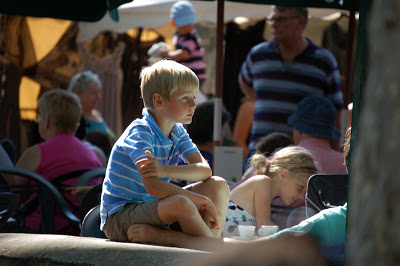 |
| Photo: David Scott Allen |
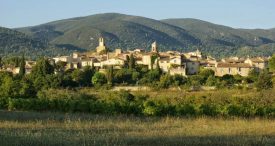
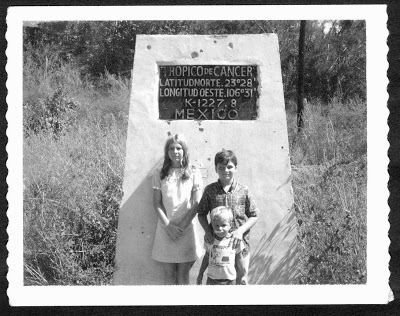
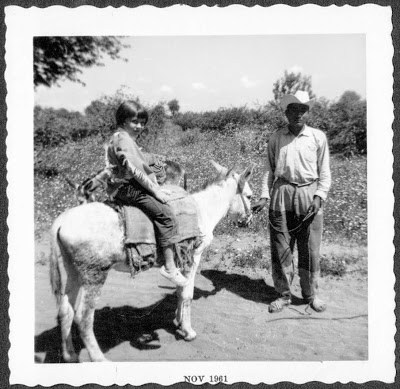
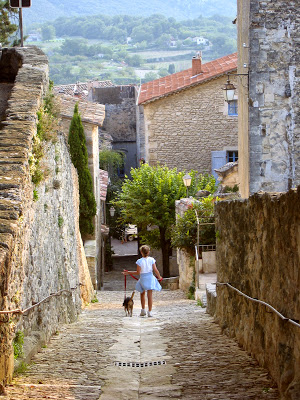
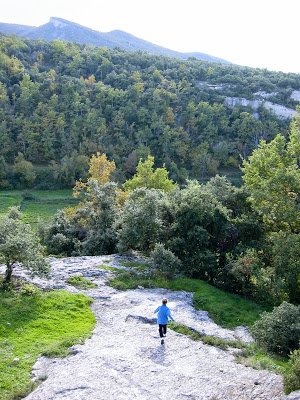
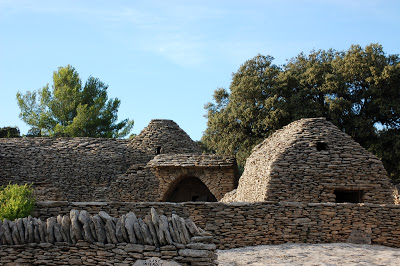
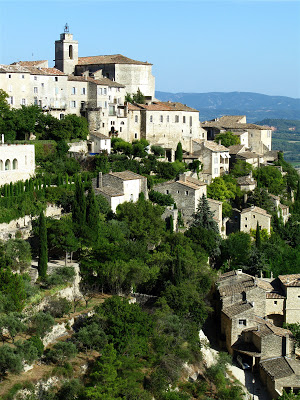
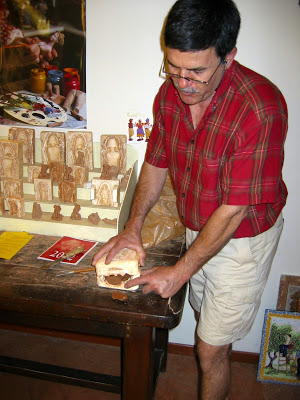
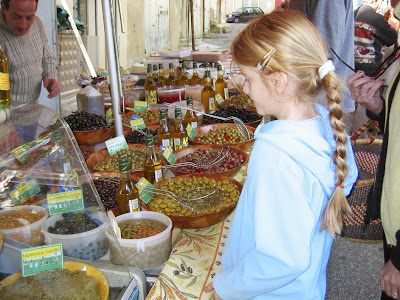
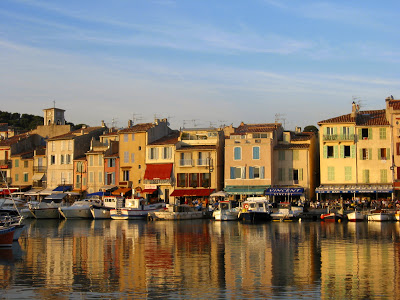
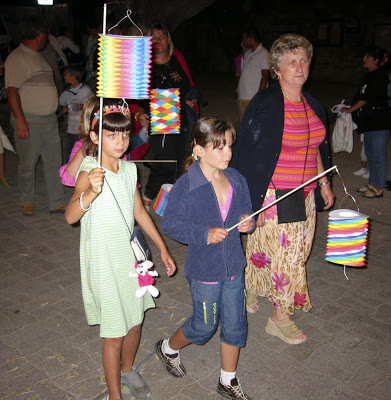
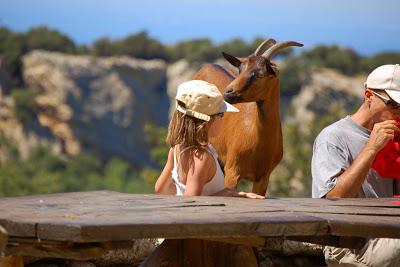
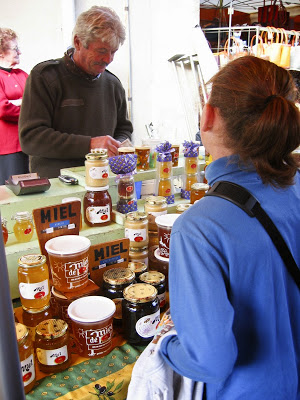
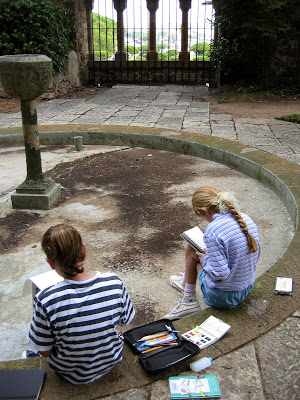
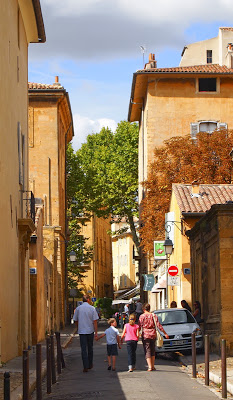





Memories memories memories, how I loved this Susan, it was a joy to read all about Lormarin and it's surrounding districts, but then your wonderful recollections of your childhood holidays to Mexico, just delightful, thanks again, Paulx
We traveled to Provence with our two sons when they were about 9 and 12. We rented a gite in Lourmarin and did many of the activities you suggested. It was a very mixed experience for our family. We had to cultivate lots of patience and an appreciation for the fact that the things that are thrilling to parents (seeing a charming village or looking at a stunning view) are often of little or no interest to kids.
The personality of your child will be a big determining factor. Our oldest was, at that age, very shy and hesitant. We rented bikes for the week so that the kids could explore the village on their own. The youngest was game, but the oldest dragged his feet. We pulled our hair out — it seemed like such a treat to have a bicycle to explore an old French village with money in your pocket for ice cream!!
Now it is a good family story and we can all laugh about it. My oldest has since been a Senate intern in D.C., taught English briefly in China, and got a Masters degree in London. He's on vacation in South Africa at the moment. So, parents need to realize that their child's behavior or preferences are largely about a moment in time. The only solution? Guide, but keep a perspective and go with the flow!!
Wonderful writings Susan.
I believe one of the best mothering decisions I ever made was to take my son to France when he was about five. The inspiration came entirely from your daughter.
I clearly remember visiting you shortly after one of your early trips to France. I had asked your very young daughter if she enjoyed the trip. She simply burst with enthusiasm, for at least a half an hour if not a full one, telling me about Monet and other artists she had learned about, and about the language, the food… I was simply blown away by her brilliance and excitement. I decided on the spot to take my five year old son to Europe.
Today my son, now 20, is studying International Relations at McGill University. Earlier he was invited to be an "American Ambassador" for the peacemaking group "Seeds of Peace" and has worked with Arab, Christian and Jewish students in conflict zones. He loves to explore different cultures and dreams of someday working in the State Department. His early travel experiences were life changing, and for that I will always be grateful to you and your lovely daughter. Merci Beaucoup, Susan!
Ah, to have been in your families when I was young. It would have been great to have the adventures you both had, although our languorous summers lakeside in Vermont had their appeal and still bring back wonderful memories.
I think the one thing a family could take away from this post is the world of possibilities they might never before have imagined. Instead of thinking "outside the box" they can think "off the beaten path." What fun everyone would have exploring someplace new. And I love your idea of the kids doing a blog for their friends. A terrific way to hone their writing skills while sharing stories.
And many, many thanks for NOT sharing the picnic photo from le Forêt de Cèdres! 🙂
If I may, I'd like to add a footnote to Susan's delightfull story of her family vacations. I'll call it "What does it take to scare a big brave man?"
We had just arrived in our motel room. We were on the second floor with a large open balcony overlooking the assigned parking spots below.
We looked up and there climbing down the a gigant TARANTULA !!, We all screamed for Daddy to get it down. He turned pale and said he'd call the desk. Within mimutes an employee arrived with a broom. He was laughing and mumbling in Spanish. With one big swipe of broom, he swept the large tarantula off the wall and over the balcony and onto the cars below and ours directly in line !!
In the morning we were scared to death to check the car. The next leg of the trip was in complete silence. We never knew when we'd get the next leg, black and hairy going up our leg !We were ever fearful that he was lurking among the luggage.
I am still wondering if he ever got away or just hitched another ride to California.
We were all relieved when we got a new car !!